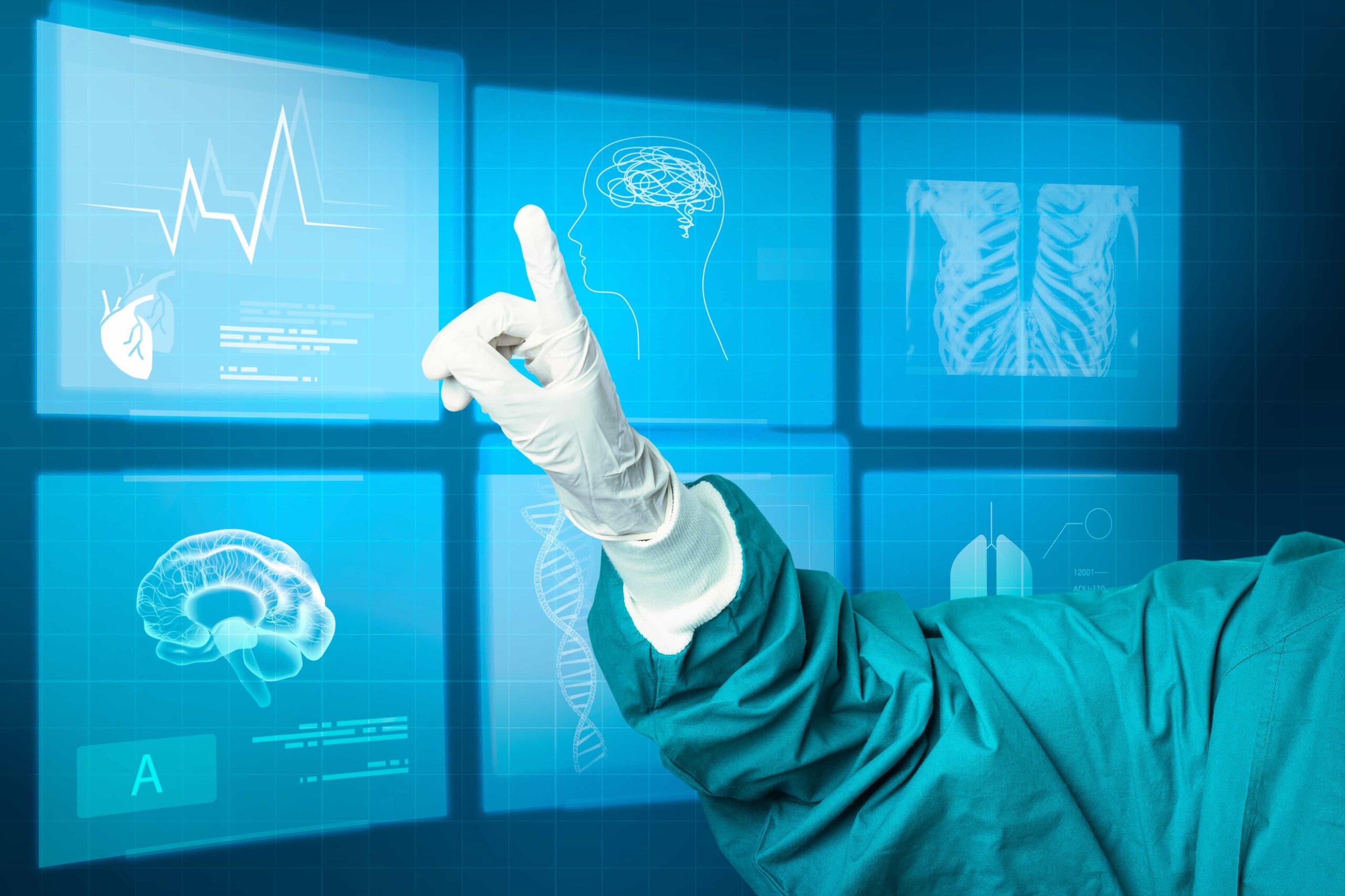A Perspective from NuSocia’s Public Health Centre of Excellence
“The greatest opportunity offered by AI is not reducing errors or workloads, or even curing cancer: it is the opportunity to restore the precious and time-honored connection and trust—the human touch—between patients and doctors. Not only would we have more time to come together, enabling far deeper communication and compassion, but also we would be able to revamp how we select and train doctors.”
― Eric Topol, Deep Medicine: How Artificial Intelligence Can Make Healthcare Human Again
Healthcare is a massive industry, worth a staggering $12 trillion worldwide. But it’s not just big, it’s also complex. From managing hospitals to finding new cures, there’s a lot on the line. This is where artificial intelligence, or AI, comes in as a powerful tool.
Imagine AI as a super smart assistant for the healthcare world. It can do things humans can’t, like process huge amounts of data in seconds. This means it can spot patterns in diseases, predict outbreaks, and even help doctors make faster, more accurate diagnoses.
It’s no surprise that AI is a hot topic in healthcare. Experts predict the value of AI in healthcare will skyrocket from $16 billion in 2022 to a whopping $173.5 billion by 2029! That’s a growth rate of over 40% each year! Why such a big deal? Because AI can save healthcare systems billions of dollars by streamlining processes, preventing errors, and improving patient outcomes.
For example, having a baby through IVF can cost a fortune – up to $70,000! But AI can help couples get pregnant faster by analyzing data and suggesting the best treatment plans. This means fewer rounds of IVF, lower costs, and happier families.
AI isn’t just about saving money. It’s also about improving care. Doctors and nurses are incredibly busy, and AI can help by handling paperwork, scheduling appointments, and even suggesting treatments. This gives healthcare professionals more time to focus on what they do best – caring for patients.
In this blog, we’ll dive a little bit into how AI can revolutionize different areas of public health, from managing hospitals to predicting diseases and making smarter decisions about patient care.
AI in Health Services Management
One of the most significant aspects of AI in healthcare is its potential to support comprehensive health services management. AI applications can assist doctors, nurses, and administrators by providing real-time medical information updates from various sources, including journals, textbooks, and clinical practices. This capability is especially critical in times of crisis, such as during the COVID-19 pandemic, when the rapid exchange of information is vital for effective management.
AI also facilitates the seamless coordination of information tools for patients, enabling health risk alerts and health outcome predictions. This allows healthcare facilities to operate more efficiently by providing clinicians with immediate access to data, enhancing patient safety during medication administration, and keeping patients informed and engaged in their care. Moreover, AI can optimize logistics processes, such as implementing just-in-time supply systems based on predictive algorithms, thereby ensuring that essential drugs and equipment are available when needed.
When it comes to women, services and products tailored to their specific health needs are still lagging behind. A McKinsey report reveals that women spend an average of 9 years in poor health—25% longer than men—negatively impacting their productivity and earning potential. AI holds the potential to revolutionize health services management by addressing these gaps and expediting the development of more targeted solutions for women’s health.
Another exciting application of AI in health services management is its potential to bridge the gap between urban and rural healthcare services. By supporting the training of health personnel through AI-driven tools, we can create a more equitable healthcare landscape, ensuring that even the most remote areas have access to quality care.
AI in Predictive Medicine
AI’s ability to identify meaningful relationships in raw data makes it an invaluable tool in predictive medicine. By analyzing vast amounts of data, AI can support the diagnosis, treatment, and prediction of outcomes in various medical situations. This enables healthcare professionals to embrace a proactive approach to disease management, allowing for early intervention and better health outcomes.
For example, AI can predict risk factors for individual patients, helping target healthcare interventions more effectively. This personalized approach to treatment can significantly improve patient outcomes by tailoring care to the specific needs of each individual. Additionally, AI can aid in designing and developing new drugs, monitoring patients, and personalizing treatment plans, giving doctors more time and concise data to make informed decisions.
AI allows for the creation of prediction models that can monitor patients throughout their lives. This continuous monitoring can lead to early detection of potential health issues, ultimately saving lives and reducing the burden on healthcare systems.
AI in Clinical Decision-Making
One of the most promising applications of AI in healthcare is its potential to support clinical decision-making. AI can help physicians make better clinical decisions or even replace human judgment in specific functional areas of healthcare. This support is crucial in accelerating the decision-making process, improving the quality of care provided, and reducing the overall cost of health services.
For instance, algorithmic platforms powered by AI can offer virtual assistance to doctors, helping them understand the semantics of medical language and solve complex business process queries. This not only simplifies the jobs of healthcare professionals but also enhances their ability to provide accurate and timely care to patients.
AI can also analyze patient data from electronic health records, predicting data heterogeneity across hospitals and outpatient clinics, identifying outliers, and performing clinical tests on the data. This predictive capability allows for more accurate diagnostic tests and analyses, improving the overall quality of healthcare services.
AI to Revolutionize Patient Data and Diagnostics
AI’s role in managing patient data and diagnostics cannot be overstated. With the increasing amount of data generated from clinical activities, AI systems are essential for managing and analyzing this information to provide valuable insights for patient treatment. AI can help doctors in the diagnostic process, making it easier to obtain a comprehensive view of a patient’s condition and develop more effective treatment plans.
One of the most exciting developments in this area is the use of AI in rehabilitation therapy and surgery. AI-powered robots can physically support and guide patients during motor therapy, improving the effectiveness of rehabilitation programs. In surgery, AI has the potential to transform surgical robotics by enabling devices to perform semi-automated tasks with high precision, reducing the risk of human error and improving patient outcomes.
Moreover, the COVID-19 pandemic has highlighted the importance of remote patient diagnostics through telemedicine. AI-driven tools can provide remote observation of patients, offering support to physicians and nurses in monitoring patient conditions and delivering timely care.
The Future of AI in Public Health
Artificial Intelligence (AI) is rapidly changing how we approach healthcare. From helping doctors analyze medical images to developing new treatments, AI has the potential to revolutionize patient care. It’s like having a super-smart assistant working alongside doctors to make better decisions.
While AI is incredibly exciting, it’s important to remember that it’s still a tool. Unlike asking a smart speaker to play a song, mistakes in healthcare can have serious consequences. That’s why it’s crucial to have strict rules in place to protect patient privacy, make sure AI systems are safe, and work for everyone.
Creating these rules is a tricky balance. We want to encourage innovation and get life-saving treatments to patients as quickly as possible, but we also need to make sure everything is safe. AI can actually help with this by analyzing huge amounts of data to check if new products meet the necessary standards.
It’s clear that AI has a bright future in healthcare, but it’s essential to use it wisely. We need to make sure personal information is protected, that everyone understands how AI works, and that it’s used fairly. At NuSocia’s Public Health Center of Excellence, we believe AI should be used to improve the health of everyone, no matter who they are or where they live. By working together, we can harness the power of AI to create a healthier future for all.
Call to Action
As we stand on the brink of a new era in public health, it is essential for all stakeholders—healthcare professionals, policymakers, researchers, and the general public—to come together and embrace the potential of AI. At NuSocia’s Public Health Centre of Excellence, we invite you to join us in advocating for the responsible and ethical use of AI in healthcare. Together, we can harness the power of AI to create a healthier, more equitable future for all.
References
Oladele, T. O., Oladele, E. A., Thompson, J. A., & Akpovi, S. U. (2021). Systematic review of the applications of machine learning and artificial intelligence in decision-making for neglected tropical diseases. BMC Medical Informatics and Decision Making, 21(1), 1-14. https://doi.org/10.1186/s12911-021-01488-9
Oberoi, P. (2024, July 2). Can AI really transform women’s health? Forbes. https://www.forbes.com/sites/priyaoberoi/2024/07/02/can-ai-really-transform-womens-health/




